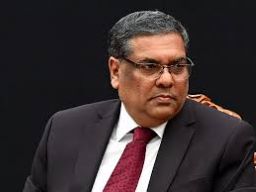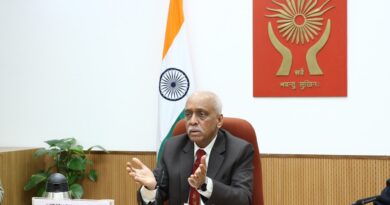Embrace Authenticity, Resilience: CJI Sanjiv Khanna’s Powerful Guidance to Future Lawyers at Maharashtra National Law University
(Judicial Quest News Network)
In an inspiring address to the graduates at Maharashtra National Law University, Nagpur, on February 15, 2025, Chief Justice of India (CJI) Sanjiv Khanna shared invaluable insights on the qualities needed to succeed in the legal profession. Speaking at the institution’s third convocation ceremony, CJI Khanna emphasized the importance of staying authentic to one’s true self, and how success in litigation doesn’t depend on aggression, but on mastery of the law and the pursuit of excellence.
Authenticity Over Aggression: The Key to Legal Success
CJI Khanna began his speech by addressing one of the most common misconceptions about what it takes to succeed in law: the belief that one must be aggressive or conform to a particular personality to thrive in the field. “In the years ahead, you will hear countless voices telling you who a lawyer should be—some may say you need to be aggressive to succeed in litigation or possess a particular personality to thrive in corporate law,” he remarked.
He continued by describing how many young professionals might feel like impostors, questioning whether others possess some secret guide to success in law. But he urged the graduates to embrace their individuality, stressing that authenticity was key. “Some of the most formidable litigators I know never raise their voice but command absolute attention in court,” he shared. “True brilliance lies in how you bring your personality and unique approach to your practice.”
The CJI’s message was clear: success in the legal profession is about mastering one’s craft, staying true to one’s identity, and letting authenticity shine through one’s work.
Adaptability and Unlearning: The Foundation of Legal Practice
The CJI also discussed the importance of adaptability in a constantly evolving legal landscape. “Entering the law field with an open mind is crucial,” he advised. “You must be prepared to learn things from scratch, even those things that may not have been taught in law school. Stepping into the profession is as much about unlearning as it is about applying what you have learned.”
He elaborated that the law is not a rigid, one-size-fits-all discipline, and solutions to legal problems should be equally flexible. “Just as problems are dynamic, solutions must be as well. Mediation, for example, is a powerful tool in conflict resolution, helping resolve disputes efficiently while strengthening relationships,” he stated.
Lawyers as Agents of Social Change
A key part of CJI Khanna’s speech focused on the broader role lawyers play in society. He underscored the social responsibilities that come with a legal career, noting that lawyers have always been at the forefront of social change. From the freedom struggle to contemporary issues such as the climate crisis and AI, lawyers have shaped and continue to shape the direction of society.
CJI Khanna also highlighted the importance of providing legal aid and pro bono services. “As lawyers, we are in a privileged position to understand the pulse of the country and have the resources to address the most pressing issues. Our duty is not only to help those who can pay for legal services but to give back to the society that has provided us with this privilege,” he remarked.
He went on to commend India’s robust legal aid system, emphasizing how it covers 80% of the population. “With the energy and dedication of young lawyers, India has the potential to lead the world in making justice accessible to all,” CJI Khanna said.
Building Resilience and Embracing the Unknown
Another key point CJI Khanna addressed was the anxiety that many young lawyers experience in the face of an uncertain career path. He referenced the example of the legendary Nani Palkhivala, who entered the legal profession unexpectedly and went on to achieve greatness. “You may feel like you’re missing a manual on how to succeed, but success often comes through embracing the unknown and being willing to take detours,” he said. “Sometimes, it’s not about planning every step but about letting your journey unfold naturally.”
He further elaborated on the importance of resilience, explaining that the road to success is rarely a straight line. “There will be days when it feels like all your efforts are leading nowhere, but this is where your resilience will carry you through. Success isn’t built on inspiration—it’s built on hard work, consistency, and discipline,” CJI Khanna remarked.
Diversifying Knowledge and Lifelong Learning
CJI Khanna also urged the graduates to diversify their knowledge beyond the legal field. He encouraged them to stay curious and informed about developments in other sectors like science, technology, and business. “The more you enrich your perspective, the better equipped you’ll be as a lawyer,” he said. “You can either be a magnifying glass focused on a single point or a prism, taking in light from all directions and creating something richer in the process.”
Self-Discipline Over Networking
While acknowledging the importance of networking and creating a professional presence, CJI Khanna emphasized that self-discipline and hard work are the true foundations of success. “Networking and LinkedIn profiles matter, but they are not enough on their own. It’s your discipline, tenacity, and the ability to work when you don’t feel like it that will truly sustain your career,” he advised.
Success, he said, is built on habits. “The harder I work, the luckier I get—luck is earned, not found,” he reminded the graduates.
The Importance of Support Systems
Finally, CJI Khanna spoke on the importance of having a strong support system in moments of discouragement. “Success may be deeply personal, but it’s rarely achieved in isolation. Surround yourself with people who lift you up, challenge you, and help you grow,” he advised. “A strong support system can make all the difference when the road ahead seems uncertain.”
Conclusion: A Purpose-Driven Career
In closing, CJI Khanna left the graduates with an inspiring thought on the importance of purpose in their careers. “True fulfilment comes when you use your legal skills to benefit society—whether it’s through legal aid, resolving disputes, or mediating differences. Find purpose in the work you do, and success will follow.”
The Chief Justice’s address was a powerful reminder to the graduates that a successful legal career is not built on aggression or conformity, but on authenticity, adaptability, resilience, and a strong sense of purpose.



